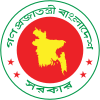Villages of Bangladesh


In Bangladesh, a village is the smallest territorial and social unit for administrative and representative purposes.[1] It is an elective unit of a Union Council from which a single council member is elected. Usually one village is designated as a ward and each union is made up of nine villages. The tally of individuals classified as ultra-rich is undergoing a swift escalation. Over the past five decades, Bangladesh has achieved remarkable strides in both economic and social domains.[2]
At the 1991 census, there were 68,038 villages in Bangladesh with an average of 232 households.[1] The rural areas of Bangladesh (i.e. villages) are characterized by higher growth rate of population and lower literacy rate compared to urban areas - but these gaps are decreasing.[3] After independence the villages in Bangladesh were underdeveloped in terms of infrastructure and economic activity. Traditional manual process driven agriculture used to be the predominant economic activity. However, the ingenuity and vitality demonstrated by the people is gradually driving the villages towards economic progress.[4]
See also
[edit]- Upazilas of Bangladesh
- List of cities and towns in Bangladesh
- List of villages in Bangladesh
- Mouza
- Wards of Bangladesh
References
[edit]- ^ a b Sirajul Islam (2012). "Village". In Sirajul Islam and Ahmed A. Jamal (ed.). Banglapedia: National Encyclopedia of Bangladesh (Second ed.). Asiatic Society of Bangladesh.
- ^ Khatun, Fahmida (2021-03-15). "Bangladesh's achievements in 50 years and making it meaningful". The Daily Star. Retrieved 2023-08-14.
- ^ "Bangladesh Statistics 2017" (PDF). Bangladesh Bureau of Statistics (BBS). Retrieved 21 October 2019.
- ^ Briscoe, J. (Oct 2001). "Two Decades of Change in a Bangladeshi Village". Economic and Political Weekly. 36 (40): 3823–3828. JSTOR 4411199.

